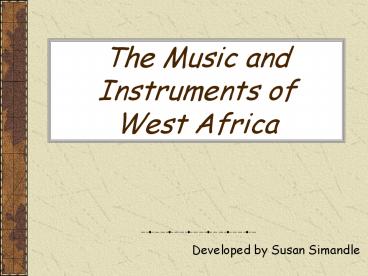The Music and Instruments of West Africa - PowerPoint PPT Presentation
1 / 26
Title:
The Music and Instruments of West Africa
Description:
Music is an integral part of every African individual from birth. ... In some African societies music is a dynamic and driving force that animates the ... – PowerPoint PPT presentation
Number of Views:275
Avg rating:3.0/5.0
Title: The Music and Instruments of West Africa
1
The Music and Instruments of West Africa
- Developed by Susan Simandle
2
- Africa is
- a land of
- many
- countries,
- climates,
- and
- cultures.
3
It is a place of modern cities . . .
4
. . . and traditional villages.
5
- Music is an integral part of every African
individual from birth. www.acslink.aone.net.au/chr
isto/histmain.htm
6
- In traditional
- African societies,
- the absence of
- music in daily life
- is unthinkable.
- Music is used to
- heal the sick, praise
- a leader, ensure
- successful delivery of a child, cure bed wetting,
- and even to stop a woman from flirting with
- another woman's husband. Music is also involved
- with birth, naming of a child, teething,
marriage, - new moon, death, puberty, agriculture, reenacting
- of historical events, hunting, preparation for
war, - victory celebrations and religious rites.
7
- In some African societies music is a dynamic and
driving force that animates the life of the
entire community. www.acslink.aone.net.au/christo/
histmain.htm
8
Purposes
Social/Recreational
Ceremonial
Music and dance done to recognize the
occasion Can vary each time it is performed
Music and dance that is spontaneous and full
of improvisation
Ritual
Artistic
Music and dance that has a choreographer who
has decided what to do and when Performed
on stage
Music and dance that has to be done the same
way each time it is performed
9
Ceremonial/Ritual
- Crowning a new king
- Weddings
- Birth
- Funerals
- Puberty
- Just about any major milestone in a persons life
10
Entertainment
Songs are sung about all aspects of life
planting, hunting, weather, birth, death just
about anything.
11
- Some African societies have professional
musicians, called griots. Griots are responsible
for recording tribal histories and
genealogies. Unfortunately, griots are not always
given respect.
12
- Ensemble drumming
- is practiced
- throughout West
- Africa. Drum
- ensembles play for
- social occaisions,
- ritual, ceremonies,
- weddings, funerals,
- parties, and
- religious meetings.
Other instruments often join the drums to
accompany singing and dancing. Drumming, singing,
and dancing are often performed in a circular
formation going counterclockwise. Drums are also
used in artistic performances.
http//www.sbgmusic.com/html/teacher/reference/c
ultures/westafr.html
13
- Drum ensembles are often led by a master drummer
who plays solos against the overlapping patterns.
The master drummer also leads the ensemble by
playing signals that tell the other players to
switch to a different section, change drum
patterns, change the tempo, signal the dancer, or
end the piece. http//www.sbgmusic.com/html/teache
r/reference/cultures/westafr.html - Master Drummer Yaya Diallo
- www.onzou.com
14
- Drums are among the most important art forms in
Africa, used both as a musical instrument and as
a work of sculpture significant in many
ceremonial functions, including dance, rituals,
story-telling and communication of messages.
http//www.hamillgallery.com/YORUBA/YorubaDrums/Yo
rubaDrum02.html
15
- In West Africa, the music has great rhythmic
vitality, making use of polyrhythms, or several
rhythms played simultaneously.
16
Instruments
African instruments can be divided
into three
categories
idiophones, chordo- phones, membrano-
phones.
17
Idiophones
- Idiophones are self-sounding instruments, such as
the balaphon, mbira, and rattle.
18
The balaphon is also known as the marimba. It
has wooden bars and gourd resonators. It looks
like a
xylophone.
Each ethnic group has its
own shape of balafon.
19
The mbira, also known as the thumb piano, is
made with flattened metal bars and played with
the thumbs.
20
The shekere (aka the axatse) is made by tying a
net of beads around a gourd. Shakers can also
be made by weaving baskets to hold pebbles or
seeds.
21
Chordophones
- Chordophones are stringed instruments, such as
the mouth bow and kora.
22
The mouth bow is a stringed instrument that uses
the mouth as a resonator.
23
The kora is the precursor to our banjo. It is
made with a large gourd covered with animal
skin.
24
Membranophone
- Membranophones create sound by stretching a
membrane over an opening. The kora might be
classified as a membranophone, but the most
obvious membranophone is the drum.
25
The djembe is probably the most familiar African
drum in America. Djembe patterns are mostly
made up of three tones, pa (the slap), go (the
tone), and gun (the bass).
26
The talking drums are based on the tonal quality
of many native African languages. The drum is
held under the arm. When the drum is squeezed,
the drumhead tightens and the pitch goes up. When
the pressure is released, the pitch goes down.































